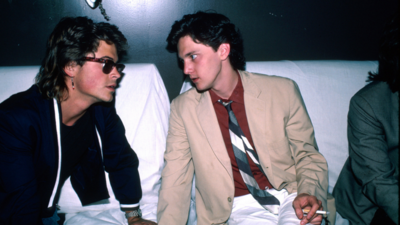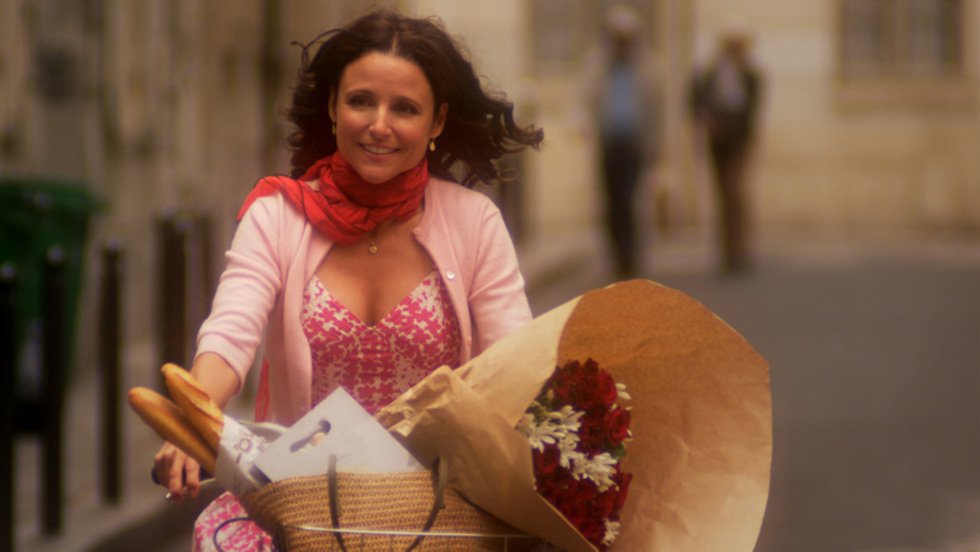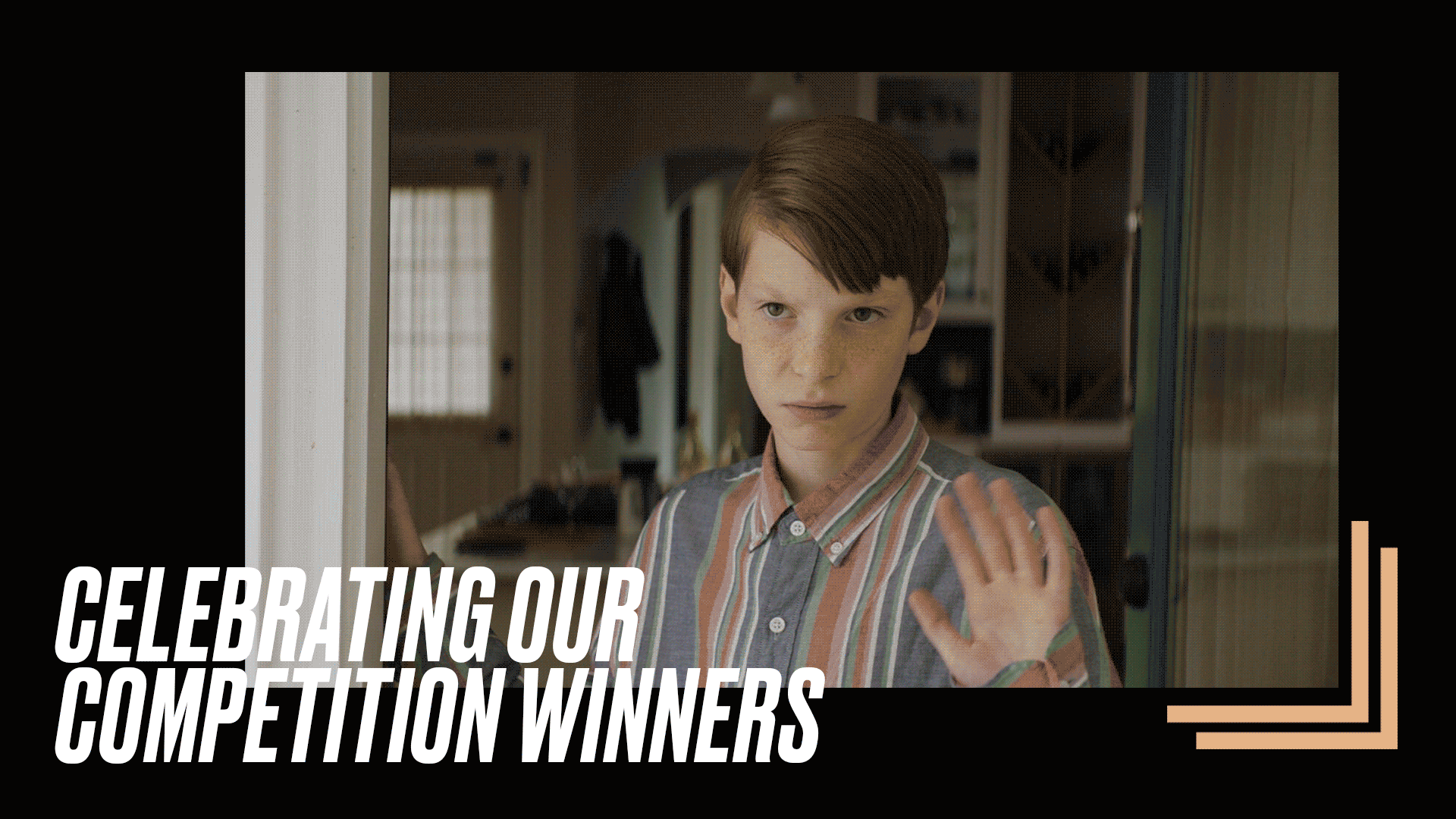
BY KRISTIN MC CRACKEN |
Julia Louis-Dreyfus And Brad Hall Take Us Abroad In "Picture Paris"
Brad Hall directs his wife Julia Louis-Dreyfus in "Picture Paris," a delectable “long-ish short” about a woman who finds herself on the streets of Paris. This pleasing amuse bouche from TFF 2012 premieres on HBO this Monday, December 17, at 9PM.

Note: This interview originally ran as part of our coverage of the 2012 Tribeca Film Festival.
Tribeca: First of all, I loved Picture Paris. I can’t wait for Tribeca audiences to see Picture Paris. How do you describe it in your own words?
Julia Louis-Dreyfus: It’s about life transitions. Picture Paris is a film about a woman whose last child is going off to college, and in an effort to make herself feel better about being without children, she becomes compulsively obsessed with a trip she’s going to take to Paris with her husband the day after her son leaves. And that’s what the film is about, except nothing happens as she would predict it might—hopefully for the audience as well.
Tribeca: What inspired you both to tell this story? (Any annoying friends obsessed with Paris that will remain nameless?)
Brad Hall: [laughs] We are those annoying friends. And we do have a son who went away to college, so we have that point of view. When he left for school, we found ourselves suffering much more deeply than we had expected to, which led me to think about the potential we all have for these massive, gigantic feelings that we don’t always let ourselves have. That’s what I wanted to explore.
Tribeca: There are a few great twists, but I won’t give anything away. How did the script evolve? Did you always have this ending?
Brad Hall: After I’d written it, I wondered, is that just too much? And then we thought, no, what the hell! I’m sure it will be divisive, and that’s just fine.
Tribeca: I was watching on my laptop with my headphones, and I kept gasping and laughing, and my husband was like, “What are you watching?” So I was surprised.
Julia Louis-Dreyfus: Oh, good!
Brad Hall: To watch it with an audience is a lot of fun, because there are a couple of twists you don’t see coming. So, to hear the horrified gasp is very rewarding. [laughs]
Tribeca: You have a terrific cast, led by the lovely Julia. What can you tell us about the casting process? (And we love Eric Elmosnino, who won the Best Actor Award at Tribeca for his portrayal of Serge Gainsbourg.)
Brad Hall: How great was he in that movie? Eric came to us by pure and utter luck. Our fabulous producer Julie Snyder has a friend who knew him.
Julia Louis-Dreyfus: We sent her the script and she read it and thought it was great, and gave it to him, and boom, he said yes.
That’s very emblematic of how this film was made. It was like friend through friend through friend. We really did this on a shoestring budget, and we called in every possible favor we could, from every friend we’ve ever known in our lives.
Brad Hall: Jeff Perry, who plays Julia’s high school boyfriend, is a dear friend from our Chicago theater days—he’s on Broadway right now in Tribes; I really think he’s one of the unsung Great American actors.
Julia Louis-Dreyfus: And D.W. Moffett is from the Chicago days too, and Rachael Harris I’ve known for a number of years, and our set and costume designers were people we’d worked with on big-budget productions before. It was all these terrific people doing favors for us, which was just very thrilling, and, I don’t know, if felt like putting on a show, in the most old-fashioned way, which was just so rewarding.

Tribeca: Julia, you obviously have a terrific sense of comic timing. How did you prepare for your role? And were the rest of the cast so inclined? Or did you have to work with them to get the right mix of comedy?
Julia Louis-Dreyfus: No, everyone came very well prepared, and everyone actually was extremely well suited to their roles, and very capable in terms of comedy—i.e., Rachael Harris, I mean, a lot of our stuff was improvised.
Tribeca: She’s so great.
Julia Louis-Dreyfus: She’s just fabulous. So, to be quite honest, there wasn’t a whole lot of preparation I had to do, because I could just tap into some very real feelings about our oldest son going off to college, and some very real feelings I have about the lusciousness of Paris.
And then there are certain other things I’ve never done before that I did in this film, but I don’t know what I tapped into there, except somehow I did…
Tribeca: You filmed your movie on the streets of Paris (unless you totally fooled me).
Brad Hall: [laughs] No foolin’, we really did.
Tribeca: Okay, good. What's the craziest thing (or "lightning strikes" moment) that happened during production, filming on the streets of Paris?
Julia Louis-Dreyfus: Oh, so, so many. Can’t you just think of a million, Brad? For instance, that accordion player in the montage sequence—he was just there. We asked his permission if we could film him, and he said, “Ouí.”
Tribeca: It’s a perfect Parisian moment, right?
Julia Louis-Dreyfus: Right. Perfect. The subway moment was a “got” moment. We just snuck onto a subway with a camera.
Brad Hall: We were moving so fast, trying not to get caught, that we’d just pop something off, giggle, and move on. On the boat, the Bateau Mouche, we pretended that we were taking a video of Julia and me renewing our wedding vows. We got the shot, and our wedding vows are now good through Christmas.
Julia Louis-Dreyfus: We were shooting around that pond in the Luxembourg Gardens, and we were told by the police that we didn’t have a permit to shoot there, although we did have a permit to shoot there.
Brad Hall: It was very French: I said, “You mean we’re not allowed to shoot here?” And they said, “Well, you are allowed shoot here, but you can’t.”
Julia Louis-Dreyfus: And then the Gendarme sort of pointed us to another spot where he said we could shoot, which was, in fact, a place we had been told NOBODY ever gets to shoot—
Brad Hall:—it was against Napoleonic Law or something—
Julia Louis-Dreyfus: So, that extraordinary picnic shot, with the huge senate building, which looks like a chateau, was just handed to us, completely by accident, and entirely against the law, by the French police.
Brad Hall: I’d shoot in Paris any ol’ time. The French crew was all so delightful and talented and sentimental. We all cried a lot when we wrapped. Of course, it was three in the morning and we’d had a thousand bottles of wine, but there were tears.

Tribeca: I love the idea of guerrilla filmmaking in Paris! What was it like for the two of you to work together? Has that happened since you were both on SNL in the late 80s?
Brad Hall: Yeah, we did a series a few years ago, and we’ve actually worked together a lot, so we’re sort of used to it. But to have me on the set directing her, that was sort of different! How was that, Jules? Was that all right?
Julia Louis-Dreyfus: Yeah, I think it was fine, Brad. Thank you. [laughs] Yeah, it was great, actually! I mean it just reminded me very much of our theater days in Chicago. It was very invigorating. Although it was an assload of work, I have to say! [Brad laughs.] It just worked. And if it didn’t work, then we’d do something else. We called the shots. And I loved that.
Brad Hall: We are such fans of independent movies, and we see everything, but we hadn’t done it ourselves. We’ve done studio work and television work, but we really wanted to try this independent thing out, which I guess is kind of backwards. Yet people were so welcoming, and so happy to help out—our producer Julie Snyder, who’s done a lot of independent films, said, “You can do it! Just do it!” And it turns out, you can just do it, and you can do it cheap, and you can do it fast, and still get, creatively, what you wanted.
That’s why it’s so exciting to be at Tribeca with the film. It really is exactly what we wanted to do with the movie, exactly the people we want to share it with, and whose work we want to enjoy, too.
Tribeca: Brad, this is your debut as a film director. What made you decide to make a short film?
Brad Hall: I wanted to make sure I didn’t screw up on a big canvas, so I wrote a script for a little canvas. [laughs] I heard a water-colorist say that someplace. I always thought of this idea as a short story, really; I didn’t think it was novel. I mean, it’s 27 minutes, which is a long-ish short, but for me, that’s just how long this story is.
Tribeca: What are you most looking forward to about coming to Tribeca?
Julia Louis-Dreyfus: I’m from NY originally—I was born there. I have tons of friends and family in NYC, and I’m looking forward to sharing this film with people who are close to me. At the risk of sounding Pollyanna-ish, there’s a sort of exciting legitimacy to this film festival that I feel very proud about. I can’t wait to show it to people on the East Coast at such a high-profile festival. I’m actually kind of crazy excited about it.
And it’s also good timing with this HBO show Veep I’ve got coming out April 22—it’s all lining up, all nice and purty-like…
Tribeca: Wow, that’s a big week!
Julia Louis-Dreyfus: Wild, right?
Tribeca: If you could have dinner with any filmmaker (alive or dead), who would it be?
Julia Louis-Dreyfus: I would have to say Jean Renoir. What would you say, B?
Brad Hall: Oh, I’ll say François Truffaut. But a living director, I’d probably say Martin Scorsese. Wouldn’t you, Jules?
Julia Louis-Dreyfus: Oh, yes, Scorsese.
Brad Hall: Both because of his remarkable body of work, and because I have a feeling he’d pick up the check.
Tribeca: Well, it’s apropos you both picked French directors first… Okay, what’s your favorite New York movie?
Julia Louis-Dreyfus: Manhattan is one of them.
Brad Hall: Yeah, Manhattan is right up there, that’s for sure. And Taxi Driver, Mean Streets, Goodfellas, Raging Bull, West Side Story and Shaft.
Tribeca: What would your biopic be called?
Brad Hall: Mine would be called Nice Try.
Julia Louis-Dreyfus: Mine would be Eisenhower: The White House Years.
Catch Picture Paris when the short airs Monday, December 17, at 9PM on HBO.

